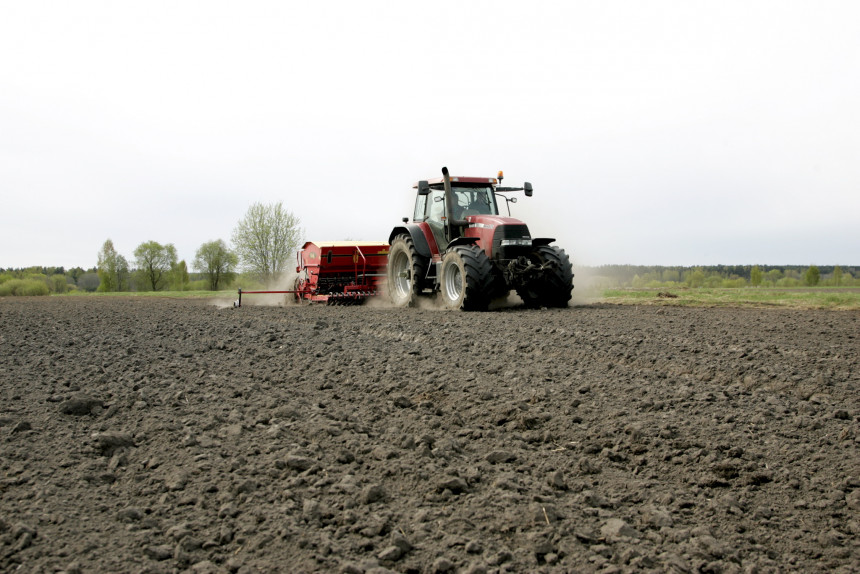Unvaccinated people are still banned from ploughing fields and sowing crops for others. Ban on hiring people without Covid certificates is starting to wreck Latvia's economy

The government of Krišjānis Kariņš (New Unity, Jaunā Vienotība) has come up with a new regulation during the Covid-19 pandemic, where a number of previous retail and other kinds of restrictions will be lifted from March 1, but "the tail of the restrictions dog is being cut off little by little" - according to the "three-step plan" of Health Minister Daniels Pavļuts (Development/For!, Attīstībai/Par!), some of them will be lifted from March 1, others may remain in force until April 1. Once again, there is deep confusion in society as to which groups and sectors will be affected by restrictions and for how long.
On March 1, the rule that you need a valid vaccination or recovery certificate to carry out work duties will be abolished, but the requirement that you need a valid vaccination or recovery certificate to carry out work duties in person will remain. However, agriculture is an area where very few activities can be carried out remotely by computer or mobile phone, as is the case for Members of Saeima. Farming and food processing involves ploughing land, sowing crops, milking cows, etc., and rarely meeting other people. Entrepreneurs themselves know better how to run their businesses so that hygiene and epidemiological safety requirements are met, and what certificates or tests to require from employees and when not to require them. Even before Covid, entrepreneurs knew that in a food production facility where many people work together, they had to worry about the possible introduction of contagious diseases, because they would lose money - many people could get sick and production would be delayed. At the same time, frequent testing and the compulsory certificate should hardly be required of a tractor driver who is alone in the open air ploughing and harrowing arable land.
Food is an important export commodity for Latvia, and unploughed fields and unmilked cows, combined with rising energy prices, are unlikely to contribute to a rise in exports and the recovery of the Latvian economy from the pandemic-era crisis.
One thing is the first spring field work, which may be disrupted, and products production, but sales are also important: food products can be produced, but they will rot if it is difficult to sell them. That is why the organizations of farmers, processors and retailers have united in their demands to the government, having been suffering from all kinds of restrictions for two years and now wanting the ruling authorities to finally calm down, stop jerking the public around and "relax", as Prime Minister Krišjānis Kariņš himself, quite sensibly, said back in January at the time.
But in the government's actual actions, the Covid paranoia is not relaxing. Latvian business organisations - the Farmers' Saeima, Latvian Agricultural Organization Cooperation Council (LAOCC), the Latvian Association of Agricultural Cooperatives, Latvian Federation of Food Companies and the Latvian Food Retailers Association (LFRA) - are demanding that the government immediately abolish the mandatory requirement for Covid-19 certification for employees and service providers, as well as the use of "green" and "red" modes at points of sale.
Juris Lazdiņš, Chairman of the Board of the Farmers' Saeima, urges the government to immediately follow the decisions of Estonia and Lithuania to ease Covid-19 restrictions.
As you know, the Covid certificate system has been abolished in Lithuania since February 5.
Edgars Treibergs, Chairman of the LAOCC Board, calls for the abolition of forced Covid-19 vaccination and the requirement for certificates. "The government should abolish the mandatory Covid-19 certification and allow farmers and food producers to supply the Latvian people with local products, allow people to enjoy the Latvian countryside and recreational areas without travelling to neighboring Lithuania and Estonia, and instead strengthen the Latvian economy," says Edgars Treibergs.
Noris Krūzītis, Executive Director of LFRA, emphasizes: "Food retailers and producers are calling for a swift end to green and red modes and to the demand for certificates in areas where they are not needed. With the spread of the Omicron variant, this system has lost its meaning - the presence of a certificate no longer guarantees a person's health status. But the blow to farmers, food producers and retailers is devastating. Sales of Latvian local food have fallen dramatically in 'green' outlets, while small 'red' outlets are unable to provide sufficient product turnover to make up the shortfall."
Although the overall situation is not completely bleak and the agricultural sector is still holding its own, there are some areas of activity where there is worrying news - a number of small dairy producers could go bust this spring. This will be precisely because of the Covid restrictions.
It is unlikely, however, that the government will go ahead and listen to the demands of the sectors.
Although there are various ministers in government, including some who listen to entrepreneurs, the dominant direction is still to ban, punish, restrict and torpedo - education, transit, traffic, tourism, etc. Agriculture, food production and retail, too. Prime Minister Kariņš and Health Minister Pavļuts cannot simply change course in a moment and announce the lifting of all restrictions. They are not ready for that yet. They have to play the bad cop for a while longer. Restricting, punishing and banning have already entered their bloodstream during the Covid, and they derive pleasure from it - from the enormous sense of power and superiority over the common people and small or medium-sized entrepreneurs.
